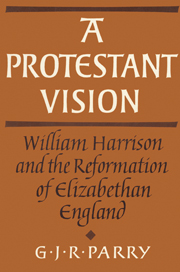Summary
Every individual who reflects upon his environment does so in the light of certain historical assumptions about that environment. The unreflecting individual commonly lacks any sense of historical perspective. This study explores the connection between William Harrison's particular historical vision and his individual interpretation of his contemporary world. Harrison is now chiefly known for his Description of Britain, published in Holinshed's Chronicles in 1577 and 1587, but the discovery of a manuscript of his ‘Great English Chronology’, the work to which he attributed far greater importance, enables us for the first time properly to examine his thought. Far from being a narrow historical calendar, the ‘Chronology’ is a voluminous and fascinating history of the world, important not only as a hitherto unknown example of Elizabethan historiography, but also as a work of Protestant historical interpretation, in which Harrison continually stressed the contemporary relevance of providential historical patterns. Indeed, this study shows that when Harrison's historical vision is placed in the context of contemporary Protestant thought what historians have described as Elizabethan Puritanism appears as the thorough-going application of a common Protestant historical outlook, to which Harrison's ‘Chronology’ gave individual expression.
European and English Protestants thought, wrote and acted in accordance with their personal understanding of this shared historical vision, and the circumstances of temperament and situation led some English Protestants to believe that providential history cast a sinister light upon the polity and institutions of the Elizabethan Church as established in 1559.
- Type
- Chapter
- Information
- A Protestant VisionWilliam Harrison and the Reformation of Elizabethan England, pp. vii - xPublisher: Cambridge University PressPrint publication year: 1987

